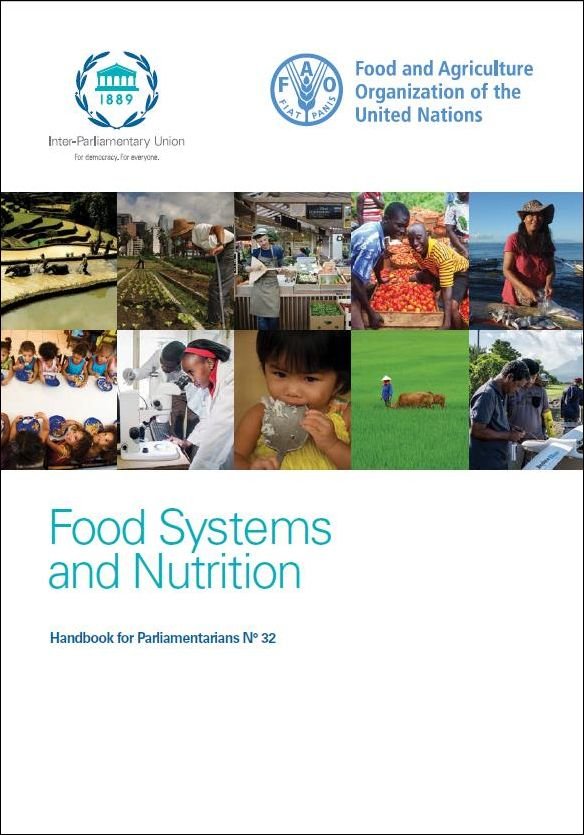 Read this article in French
Read this article in French- Share this article
- Subscribe to our newsletter
Food Systems and Nutrition handbook
The Food Systems and Nutrition handbook, published by the Inter-Parliamentary Union (IPU) in partnership with the Food and Agriculture Organization of the United Nations (FAO) in April 2021, provides lawmakers with practical guidance on legislative processes that prioritise nutrition. It was produced in collaboration with the Scaling-Up Nutrition (SUN) Movement, the World Health Organization (WHO), the United Nations Children's Fund (UNICEF) and the African Union Development Agency's New Partnership for Africa's Development (AUDA-NEPAD).
After decades of steady decline, the percentage of people who are undernourished globally has been on the rise since 2014. One out of three people on the earth suffers from at least one form of malnutrition, and the economic loss attributable to poor nutrition is estimated at USD 3.5 trillion per year. Recent research on the worldwide burden of disease has found that a suboptimal diet is responsible for more deaths than any other risk. Being one of the major global multi-sectoral issues, it is crucial that it be addressed by the world's parliaments.
The handbook emphasizes that access to food alone is not enough; people need nourishment from healthy diets. Delivering such healthy diets requires a holistic approach supporting diets made up of foods that promote all dimensions of individuals' health and well-being. This approach must incorporate the entire food system - food production, processing, distributing, marketing, supplying, eating and disposal. Every aspect of the food system must align to support good nutrition. Single interventions in isolation will likely have limited impact.
Parliamentarians can play a major role in improving food systems in their respective countries, and the handbook identifies entry points for parliamentary interventions. Recommended actions using existing case studies are described for these entry points, which cover the following four areas:
- Representation. Parliamentarians must stay engaged with their constituents to know their needs and to advocate for their welfare. They can collaborate with advocacy groups and international organisations to stay informed of the pressing issues related to nutrition and food systems.
- Legislation. Parliamentarians should be fully aware of, but not be deterred by, the complex causes leading to all forms of malnutrition. Enacting appropriate laws should be prioritised as determined by the level of need, the scale and scope of problems, and cost-effectiveness.
- Budget. There are multiple steps in the budget cycle - planning, negotiation, spending, and review - at which Parliaments and Parliamentarians can place nutrition and food systems foremost in budget-related decisions.
- Oversight. Parliamentarians can establish clear oversight processes to ensure that appropriate resources are provided to implement nutrition-related programmes, to assess the impact and to identify any unintended negative effects on nutrition of government policies and actions in all sectors, and monitor progress towards meeting national and international commitments.
The handbook is currently available in English, French and Spanish.
(FAO/ile)
Read more and download the Food Systems and Nutrition handbook at FAO website





Add a comment
Comments :
With Regards,
Getachew G
ILO Coop Consultant